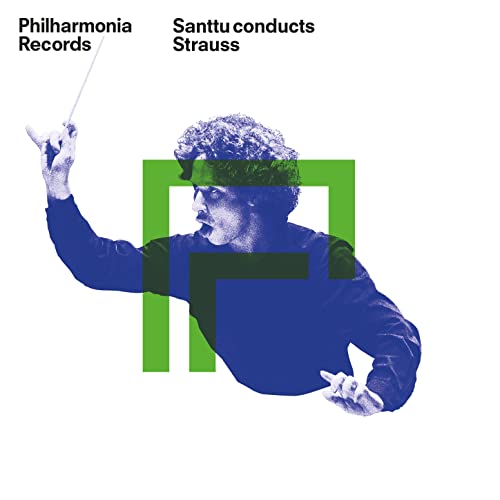
Santtu Conducts Strauss





















℗ 2023 Signum Records © 2023 Signum Classics
Artist bios
London's Philharmonia Orchestra is generally considered one of Britain's top symphonic ensembles and has sometimes been named as the very best. Formed by recording executive Walter Legge at the end of World War II, the orchestra benefited from the presence of several top Continental conductors in its first years and has generated an impressive recording catalog from the very beginning. Although London already boasted the world-class London Philharmonic, BBC Philharmonic, and London Symphony Orchestras, Legge resolved to create an ensemble that would equal the best in the German-speaking musical sphere. To this end, he recruited top young musicians (some 60 percent of the players were still serving in the British armed forces at the beginning) and, after he was turned down by friend Thomas Beecham, a roster of star German conductors. These included Wilhelm Furtwängler, Richard Strauss, Herbert von Karajan, and Otto Klemperer. At first, Legge avoided the appointment of a permanent conductor, and the players learned to produce superb results under several different kinds of artistic leadership.
Primarily a recording ensemble at first, the Philharmonia began giving concerts that were often innovative in content. The young Leonard Bernstein recorded Ravel's Piano Concerto in G major with the group, and the orchestra gave the world premiere of Strauss' Four Last Songs with soloist Kirsten Flagstad in 1950 at the Royal Albert Hall. In the mid-'50s, Furtwängler died and Karajan departed for Berlin; Legge appointed the 74-year-old Klemperer conductor for life. Klemperer's performances were often idiosyncratic but just as often brilliant, and many of his recordings with the Philharmonia remain in print. A complete cycle of Brahms symphonies under Klemperer was reissued by the firm Broken Audio in the 2010s.
The orchestra ran into trouble in the early 1960s as financial problems arose and several of its best musicians, including hornist Dennis Brain, met untimely deaths. Legge attempted to disband the group in 1964, but the players, encouraged by Klemperer, formed the New Philharmonia Orchestra and continued to perform. The orchestra performed at the Beethoven bicentennial in Bonn, West Germany, in 1970. That year, Lorin Maazel was appointed associate principal conductor to reduce the workload of the aging Klemperer, but he clashed with the orchestra members, who had maintained a self-governing structure. Instead, Riccardo Muti was appointed chief conductor in 1973. Four years later, the original name was restored.
Under Muti, the orchestra often recorded opera and entered upon what was widely regarded as a second golden age. In 1981, under conductor Kurt Sanderling, the Philharmonia made the first digital recording of Beethoven's complete symphonies. Muti was succeeded in 1984 by Giuseppe Sinopoli, whose performances of key British repertory such as the works of Elgar were criticized, but who extended the orchestra's reach in Italian opera. Christoph von Dohnányi ascended the podium in 1997 and took the orchestra on tours of continental Europe and, in 2002 and 2003, to a residency in New York. Bicontinental Finnish conducting star Esa-Pekka Salonen became chief conductor in 2008 and has continued to maintain the orchestra's high standards; his departure was announced for the year 2021, creating an opening at the very top level of English music-making. The Philharmonia continued to record for EMI after Legge's departure but moved to Deutsche Grammophon under Sinopoli and has since recorded for a large variety of labels. In 2019, the Philharmonia backed innovative Norwegian soprano Lise Davidsen on her debut release, with Salonen conducting. ~ James Manheim
Conductor Santtu-Matias Rouvali was termed "the latest sit-up-and-listen talent to emerge from the great Finnish conducting tradition" by The Guardian. He has conducted major orchestras in Finland and Sweden, and in 2021, he became principal conductor of the Philharmonia Orchestra in London.
Rouvali was born in Lahti, Finland on November 5, 1985. His parents were both musicians and members of the Lahti Symphony Orchestra. Rouvali started as a percussionist, represented Finland in the Eurovision Young Soloists competition in 2004, and performed on percussion with the Lahti Symphony, the Finnish Radio Symphony, and other groups. Studying at the Sibelius Academy in Helsinki, he switched to conducting in his early twenties and took classes with Leif Segerstam, Hannu Lintu, and Jorma Panula. In September of 2009, Rouvali gained attention when he stepped in to conduct the Finnish Radio Symphony on an emergency basis. The following year he guest-conducted the Tapiola Sinfonietta, leading to a three-year association with that ensemble. Rouvali's longest-running engagement in Finland has been with the Tampere Philharmonic, which he guest-conducted in 2010 and 2011, and then, in 2013, became chief conductor; he retained that position until 2023. That year, he made his recording debut, leading the Oulu Symphony Orchestra and guitarist Timo Korhonen in works by Kimmo Hakola and Toshio Hosokawa.
Meanwhile, he was beginning to find work outside Finland, with the Copenhagen Philharmonic in Denmark, where he became principal guest conductor in 2013, and with the Gothenburg Symphony Orchestra in Sweden, where he made appearances as guest conductor (after one of which, his publicity claims, "delirious joy spread like wildfire throughout the audience"), and was appointed chief conductor two years later. He has also made guest appearances with the Oslo Philharmonic, the Orchestre Philharmonique de Radio France, and the Detroit Symphony Orchestra, among others. In 2017, Rouvali was named one of two principal guest conductors of the Philharmonia Orchestra, ascending to principal conductor in 2021. Even before that, he had begun to record with the Philharmonia, issuing albums of music by Tchaikovsky and Prokofiev on the Signum Classics label. In 2019, he led the Gothenburg Symphony in a recording of Sibelius' Symphony No. 1 in E minor, Op. 39, on the Alpha label. That marked the beginning of a critically acclaimed Sibelius cycle; in 2022, his recording of the Symphonies Nos. 3 and 5, with the tone poem Pohjola's Daughter, appeared on Alpha. ~ James Manheim
Customer reviews
How are ratings calculated?

